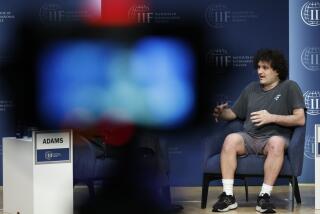Testimony in Karcher Enterprises Insider-Trading Case : Accountant Says Avoiding Loss Wasn’t Goal
LOS ANGELES — Alvin DeShano, the Carl’s Jr. accountant accused of illegal insider trading, testified Friday that he sold company stock because he wanted to diversify his investments--not because he believed the price was about to plummet.
DeShano, 54, disposed of his stock Oct. 15, 1984, the first trading day after executives at Carl Karcher Enterprises in Anaheim received a preliminary internal report showing a big earnings decline in the previous 4 weeks.
By selling 1,725 shares of Karcher stock before news of the lower earnings was announced publicly and the stock price fell, DeShano avoided $7,107 in potential stock market losses, the government alleges.
But DeShano, testifying in the fourth day of his trial on criminal insider-trading charges, said he had decided to sell his stock 2 to 3 weeks before he actually got around to calling his broker.
“I wasn’t relying on any confidential information of Karcher Enterprises once I made up my mind I was going to sell,” he said.
DeShano said he began considering a sale because he wanted to speed up the growth of his investments. That, he said, was why he discussed selling his stock in early October, 1984, with two company executives: George Cloward, Karcher Enterprises’ controller, and Steve Kishi, director of international development.
“If I believed the sale violated company policy, I wouldn’t have done it,” said DeShano, the company’s director of general accounting. “I did not need the money.”
To win a conviction, the government must prove that DeShano had criminal intent and used material, non-public information to avoid a stock market loss. But if jurors believe that other Karcher executives assured DeShano that he could sell his stock before he saw the damaging financial report, it could weaken the government’s case against him.
DeShano, who made more than $53,000 in 1984, said he and his wife had been considering buying a cabin. And in September, he said, his son Daniel had asked to borrow $5,000. DeShano made the loan 3 1/2 months later.
DeShano said that Karcher Enterprises had lost nearly $2 million in the final quarter of 1983 and that he had not sold any stock during that period.
But under cross-examination from Assistant U.S. Atty. James Sanders, DeShano acknowledged that Karcher Enterprises’ earnings had declined drastically during the first 2 months of 1984’s fourth quarter.
“You knew that when you sold, and you didn’t disclose it to anyone, did you?” Sanders asked. DeShano agreed.
The criminal case stems from a civil suit filed last year by the Securities and Exchange Commission in which company founder Carl N. Karcher, 15 members of his family and DeShano were accused of avoiding market losses of at least $310,000 in 1984 by selling securities before the earnings decline was made public.
The civil case is pending against Karcher as well as six of his relatives and DeShano. DeShano is the only one who has been criminally charged.
Testimony in the trial resumes next week.
More to Read
Inside the business of entertainment
The Wide Shot brings you news, analysis and insights on everything from streaming wars to production — and what it all means for the future.
You may occasionally receive promotional content from the Los Angeles Times.









